#lemminkäinen
Text
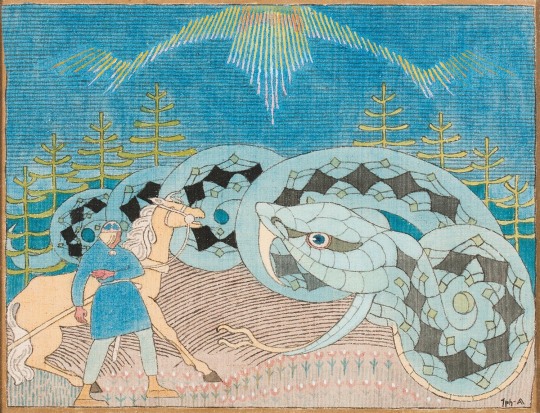
Joseph Alanen (Finnish, 1885-1920) - Lemminkäinen and the Great Snake (1919-1920)
462 notes
·
View notes
Text


lemminkäinen is a character in kalevala who, in order to win the hand of one of pohjola's daughters, is tasked to shoot the swan of tuoni
shooting the swan of tuoni brings doom to those who attempt it, and lemminkäinen even before attempting this is attacked by a man that shoots him into the tuoni river and eventually is described to be "shattered to pieces" by the son of tuoni who protects the river the swan resides in, which i always thought was a pretty gruesome visual....he's later put back together by his own mother, but there's already a famous painting about that part!
#kalevala#finnish folklore#finnish mythology#lemminkäinen#body horror#hey i Can draw the men of finnish folklore too and not just ladies lol
154 notes
·
View notes
Photo
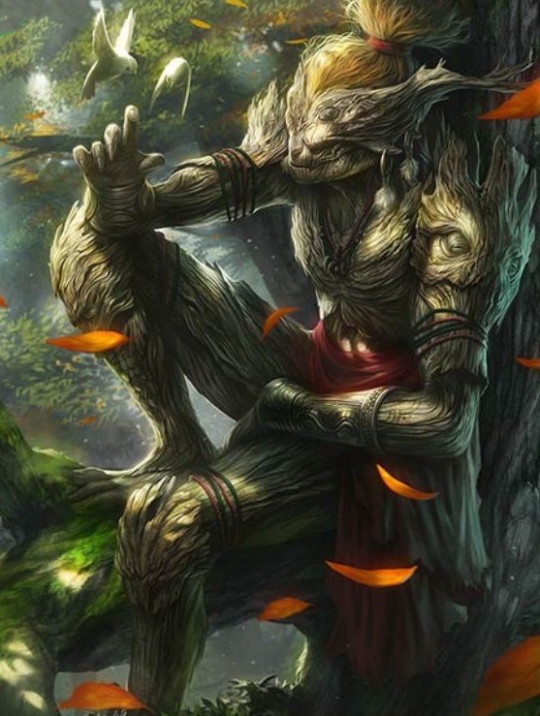
Tapio – The Finnish god of forests and the hunt
Tapio is a Finnish forest spirit or god in Finnish mythology. Hunters prayed to him before a hunt. His wife is the forest goddess, Mielikki (Ref). He is the father of Annikki, Tellervo, Nyyrikki (the god of hunting), and Tuulikki. Fitting the Green Man archetype, Tapio has a beard of lichen and eyebrows of moss.
Tapio is a major character in Kalevala, the Finnish national epic based on Finnish and Karelian folklore, the hero Lemminkäinen offers him and Mielikki prayers, gold and silver so he can catch the Hiisi elk.
Tapio, the personified forest, was sometimes depicted as being the size of a fir tree, fierce-looking, like a human being in the front, but like a gnarled old tree from behind. Often the forest deity was female, occasionally an especially beautiful woman, who enticed hunters or woodcutters staying in the woods overnight; but he, too, turned out to be a rotten old stump upon closer scrutiny. The various forest deities and spirits were generally capricious in nature and had to be constantly placated by those who were dependent on their favours. Thus hunters made offerings to the deity and made sure they did not break any taboos in the forest, such as making excessive noise or shooting unusual birds that might be the forest spirit in disguise.
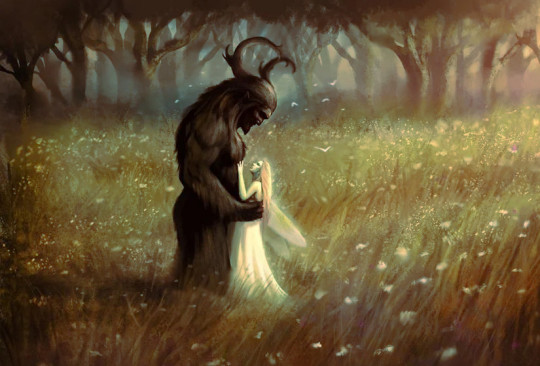
木にまつわる伝説・神話
伝説の樹木の神々 (18)
タピオ 〜 フィンランドの森と狩りの神
タピオはフィンランド神話に登場する森の精霊、または神である。彼の妻は森の女神ミエリッキ(参照)である。アンニッキ、テレルヴォ、ニャイリッキ (狩猟の神)、トゥーリッキの父である。タピオは、グリーンマンの原型にふさわしい人物で、地衣類の髭と苔の眉毛を持っている。
タピオは、フィンランドとカレリアの民話に基づくフィンランドの民族叙事詩『カレワラ』の主要人物である。『カレワラ』では、英雄レミンカイネンがヒイシのヘラ鹿を捕まえるために、彼とミエリッキに祈りと金と銀を捧げている。
森の精霊を擬人化したタピオは、モミの木の大きさで、正面から見ると人間のような獰猛な姿をしているが、後ろから見るとニョロニョロの老木のような姿で描かれることもあった。また、森の神は女性であることが多く、特に美しい女性で、森に一晩滞在する猟師や木こりを誘うこともあったが、彼もよくよく観察すると、腐った古い切り株であることが判明する。森の神々や精霊は気まぐれな性格で、その恩恵にあずかる者は常になだめなければならなかった。そのため、猟師は神に供物を捧げ、森での禁忌を破らないように気をつけた。例えば、過剰に音を立てたり、森の精霊の変装かもしれない珍しい鳥を撃ったりしないようにした。
#trees#tree legend#tree myth#tapio#mielikki#kalevala#karelian folklore#finish mythology#god of forests#tree spirit#lemminkäinen#legend#myths#folklore#green man#nature#art#forest
188 notes
·
View notes
Text

Recovery of Lemminkäinen's head from the river of Tuonela (Hades).
Lemminkäinen was a worrior who met his death in a cruesome manner and his body was chopped into pieces and drowned in a river. His mother goes to look for the pieces by raking the river. She finds the pieces of his body and with the help of a bee who flies to heavens to get ointments that bring Lemminkäinen back to life.
Falling in love wiht Kalevala. It's a book of poems based on Karelian folklore.
#kalevala#lemminkainen#lemminkäinen#death#northern mythology#myth#mythology#karelian mythology#nordic mythology#finland#russia#karelia#finnish#karelian
12 notes
·
View notes
Photo


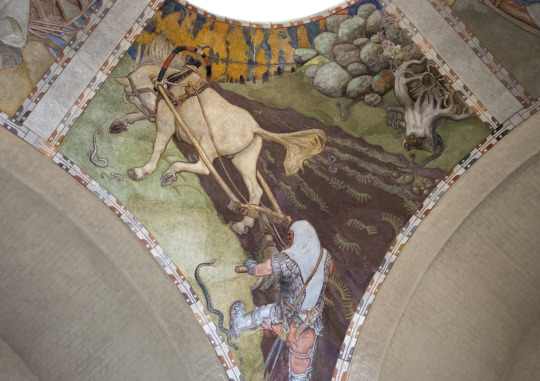
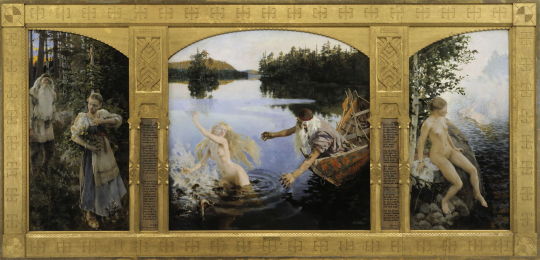




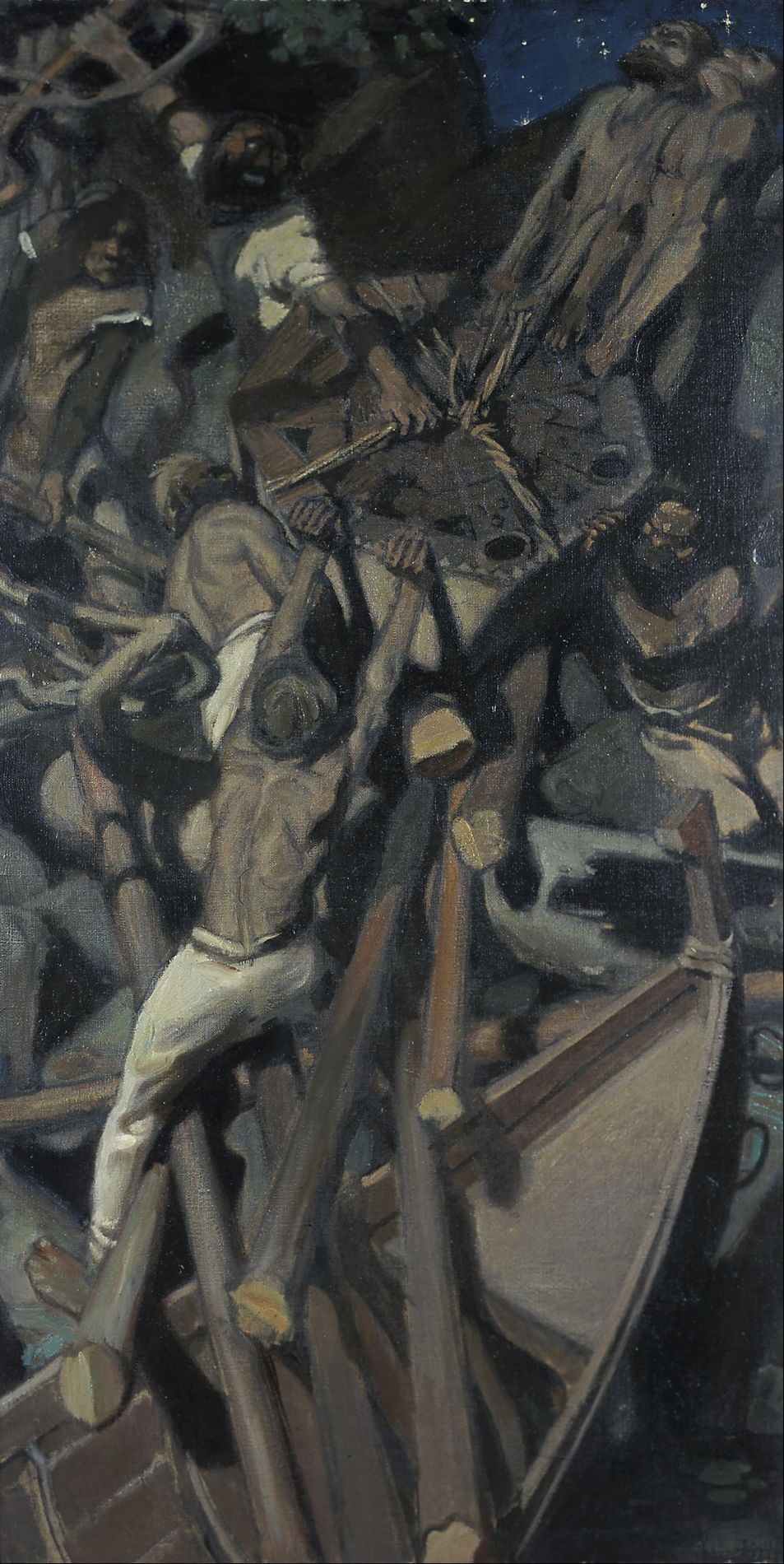

Akseli Gallen-Kallela (1865–1931), illustrations from the Kalevala
The Defense of the Sampo (Sammon puolustus), 1896
Lemminkäinen’s Mother (Lemminkäisen äiti), 1897
Ilmarinen Ploughing the Field of Vipers (Ilmarinen kyntää kyisen pellon), 1928
Aino Myth, Triptych, 1891
By the River of Tuonela (Tuonelan joella), 1903
Joukahainen’s Revenge (Joukahaisen kosto), 1897
Lemminkäinen at the River of Fire (Lemminkäinen tulijoella), 1920
Kullervo Cursing (Kullervon kirous), 1899
The Abduction of Sampo (Sammon ryöstö), 1905
Forging of the Sampo (Sammon taonta), 1893
#Kalevala#Akseli Gallen-Kallela#Akseli Gallen Kallela#art#mythology#Finland#Finnish mythology#Sampo#Kullervo#Forging of the Sampo#The Abduction of Sampo#The Defense of the Sampo#Lemminkäinen's Mother#Ilmarinen Ploughing the Field of Vipers#Aino#Lemminkäinen#Tuonela
93 notes
·
View notes
Text
Väinämöinen: If I say I love you, will you say it back?
Aino: Yes.
Väinämöinen: I love you.
Aino: It back.
*Later*
Lemminkäinen: Why is Väinämöinen crying face-down on the floor?
31 notes
·
View notes
Photo

I love either very cute characters or very crazy ones
#Postal Dude#Postal 2#Lemminkäinen#chernobyl#mr. arashi's amazing freak show#soichi tsuji#Junji Ito#dungeon ceeper#the blind prophet#batman who laughs#tzekel kan#pinhead#Witold von Everec#ivarr ragnarsson#ivarr the boneless#osmosis jones#Thrax#Snapper#troll tales#klaus margu#hellblade senuas sacrifice#shook lock and barrel#the nightmare before christmas#idk where from that red haired butterfly man sorry#arthur and the minimoys#beetlejuice#Deus EX#witcher gaetan#witcher#rasputin
59 notes
·
View notes
Text
The Shadow that Snuck Too Close;
Finnish folklore, Falling into the notch and Fateful encounter
Reading up on some mythology again and after a helpful tip from my buddy, I saw some interesting references to finnish mythology in OPM manga. I'd like to go over some pertinent things that may be referenced and how it then relates to OPM OVA 1 in season 1.
Specifically, loveen lankeaminen (falling into the cleft/notch).
Finns may recognice some similarities with the song from Kotiteollisuus with Garou that I was linked by a friend of mine.
youtube
Too long post ahead. Despite being finnish, funnily enough, there's probably a lot of holes in my knowledge about finnish mythos, so some concepts might be convoluted or difficult to explain (especially when im relying on a translator because there is no english wiki and even then the context differs at times). And I have little clue if there are similar things referenced in mythos elsewhere.
Lovi is a supernatural state or place in Finnish mythology. Lovi was apparently an underwater or underground Tuonela or a gap between the afterlife and reality. The Lovi could be located under a lake, for example in another lake behind a hole in the bottom of the lake, like the Saivo-vainajala of the Saami. It is known in particular for the tradition of notching and notch-hoisting.
In Finnish folklore, falling in lovi means a journey to the underworld, possibly by a wise man or shaman who falls into a trance state. Sometimes falling in lovi can also mean trance practised by other peoples. Cultural researchers and anthropologists have also traditionally referred to the Saami trance journey as loveenlankeja, although the Saami have their own term for the delivery. The English translation of the Bible also mentions 'falling in love'. Love is usually a process of asking ancestors for information.
In colloquial language, the word 'falling in lovi' has also come to mean 'falling in love' as a derivative of the English word 'love'.
The souls of deceased members of one's own family may, for example, have been raised from the notch into the human air by casting spells, for example, to become characters or guardian spirits.
(excuse the bad Deep L translations)
Specifically, Lovi is the name of a narrow cleft, hole, notch and lankeaminen means falling in, sinning, straying, indulging, giving in.
And yes, it is very specifically also a wordplay about falling in love. With a somewhat negative connotation that one is not supposed to.
But also in this case, it's a shamanistic journey for Saitama through the gap between afterlife and reality. Shamanism is depicted in the Phoenixman versus Child emperor fight.
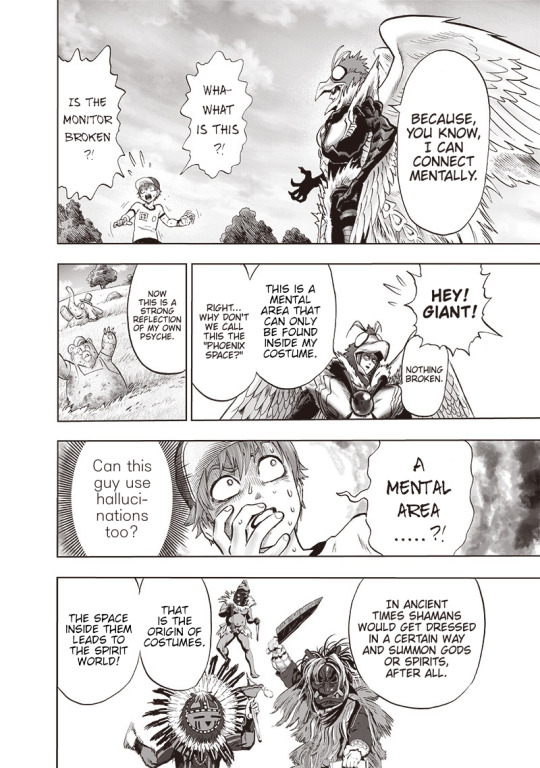
There are many similarities between the Sanzu river and finnish Tuonela, so by intents and purposes, it's the same place being referenced. The spiritual world and the afterlife. Saitama can access this place, as we saw when he punched his way into the spiritual place made by Phoenixman.
The gods or spirits is more than likely a reference to guardian spirit, but also in finnish, the term Luonto not only means nature, but also:
Luonne eli Luonto refers to the significant functional features of a thing or phenomenon that persist in different situations. Luonne often refers to the individual characteristics of the behaviour and state of mind of a conscious or sentient being, such as a human or animal
The original meaning of the word 'nature' (luonto) is the protector of man. The word nature has the same meaning. According to Finnish mythology, human nature is a spirit being that follows man and influences his happiness, character and success. Only later has the word nature acquired its present meaning.
Etymologically, the word 'nature' refers to creation.
Nature is a bit like the guardian angel of Christianity. Every human being has a nature that follows him, protecting him and bringing him happiness. People with a strong nature, those with a strong nature guardian, often do better than those with a weak nature. Nature sometimes appears as a double of man. Nature can precede man as a figurehead. This is how the term "Etiäinen" has been explained.
Lots of wordplays here again, excuse the deep L translations. But a guardian spirit that would essentially follow a man and influence a person's happiness, character and success. But also how the nature of a man precedes them as a figurehead.
It opens up an interesting interpretation about monsters, the true intention and what the God/thing below truly is (as it appeared to Homeless emperor in gusts of wind like a nature spirit).
It is not the first time Saitama has been refered to as monstrous, abominable fist and how he himself feels like his destructive nature is monstrous. And how killing monsters seemingly awakens this nature in him.
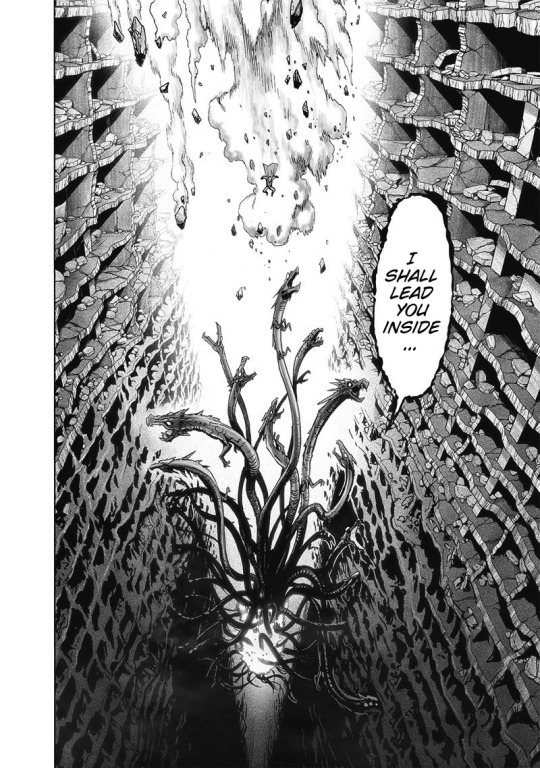

(yea that is the very definition of lovi if I've ever seen one, falling into the cleft/notch)
It may be a reference to Saitama "falling in love" with his monster nature and embracing it by killing monsters with his divine power.
It may also be a reference to shaman-adventurer Lemminkäinen journey In Kalevala to Pohjola when he gets thrown to Tuonela. Tuonela is the finnish underworld of death. The shamanistic journey one makes when in a trance-like state to visit Tuonela by tricking the guards.
Also in the Kalevala, the adventurer-shaman Lemminkäinen goes to Pohjola to woo the daughter of Louhi, a powerful old sorceress. Louhi gives Lemminkäinen three tasks he must complete to woo her daughter. While trying to complete the third task, killing the swan of Tuonela, Lemminkäinen is cut into pieces by a water snake and thrown into a whirlpool in the river of Tuonela. Lemminkäinen's mother is alerted of his death by a magical charm. She goes to the river, and rakes out the pieces of her son's body. With the help of a bee, Lemminkäinen's mother pieces together his body, and brings him back to life.
In some piece of mythos, Lemminkäinen's mother does not raise Lemminkäinen back to life however.

(notably the only places I've heard Saitama say "ow" is when cat scratched him, when he's in this whirlpool and when he's very deep inside the earth next to laval)
(it may be a reference to how spirits are more sensitive to cold and heat and how Saitama still gets cold shivers)
Before actually meeting Orochi, Saitama felt really shit spiritually after going around in the underground for quite some time.

(Looks really like a water snake huh?)
But once he took a dip in the lava and used his divine power to kill Orochi, he felt a lot better. Orochi became a sacrifice in more ways than one it would appear.

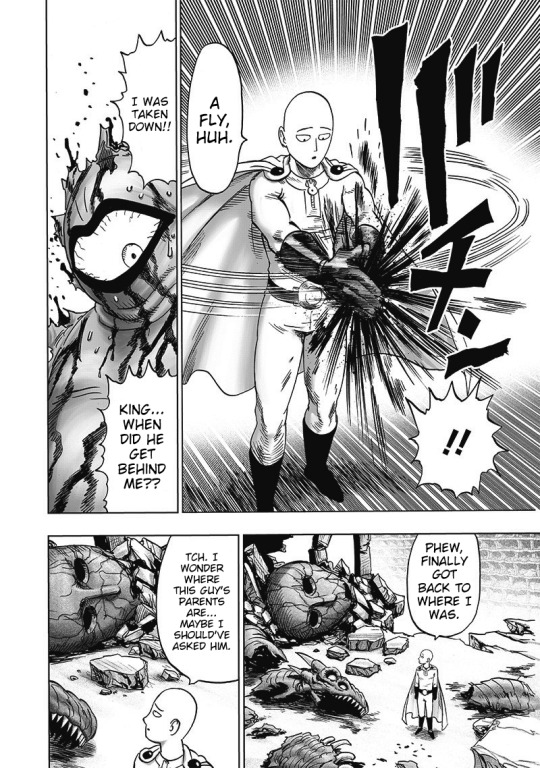
The third task of Lemminkäinen, killing the sacred swan of the underworld with one arrow, is a failure, just like how Saitama does not kill Orochi in one blow. And attempting to kill it is punishable by death.
It may also be a reference to Garou as the swan of the underworld, corrupted in black and Saitama ultimately, does not kill Garou either. But he makes an attempt and opts not to. The riverbed in the cover has many similarities not just with the riverbed of the sanzu, but also Saivo. There is a depiction of dead fish and bird carcasses in the shore.
Lakes Saivo are thought to have been fishy and their fish particularly good. Their occasional lack of fish is explained by their double bottom (reahpenjávrit, 'rag lakes'). According to many Sámi beliefs, in some very fishy lakes no fish can be found because the fish have gone through a hole in the middle bottom into another lake below the bottom.
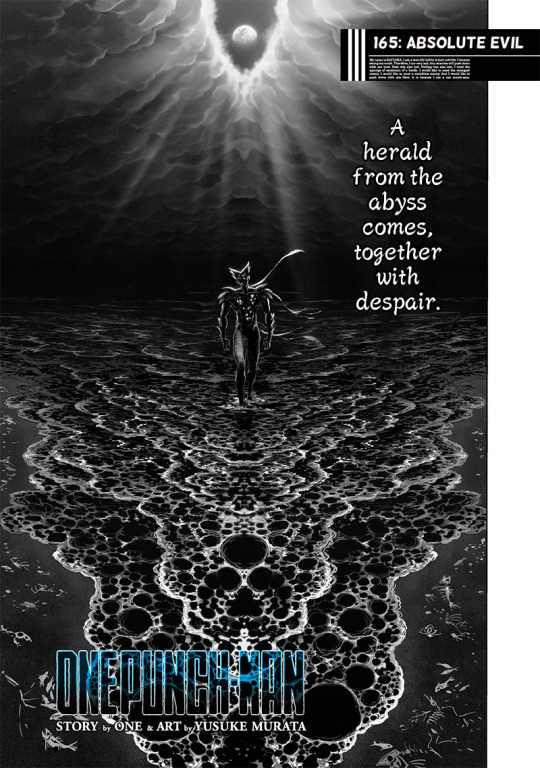
(I've also read some thoughts about how Garou looks graceful when he fights, like a ballerina dancing with dainty hands and pointy ballerina feet and it can absolutely be a reference to the ballet Black swan)
Loveen langennut, someone who fell in love, like feeling familial love between someone who you think is a grandpa figure and being a big brother to someone who needed protection, falls into the notch between afterlife and reality. Loveen langennut, someone who gives in and strays and indulges and sins in the feeling of love. Basically fallen.
The days are like cold nights of the hoarder
light
or a black, long tunnel, at the end of which you can see
only thirst, say
I can't say it better, I'd cry now even if I were sober
I look behind me and I'm a pillar of salt to these
in these corners
Kerto:
You make me resist God, you make me resist the world
You've fallen in love
I don't know if it's evening or morning
I have lived with the living
now I die away with the dead
fallen in love
I am and I walk pale as a ghost
fallen in love
I am and I walk pale as a ghost
fallen in love
I walk like a little boy, staring at my shoes or the street
There was no prince, no princess, there was no fairy tale
But a street
I don't know how, and though my bottle is not enough, perhaps I can only sigh.
But I'll sing praises to it, I'll shelter it
I'm going to take her to my bosom
Tell
I can see with these dim eyes,
When it arrives
Death walks in its blackness,
And falls
at last my world,
And I know not how to fear
To the hard world no more
No need to wake up
He saw with his hazy eyes a black figure that offered him such kindness that he desired, so he fell into the notch. And for resisting God, he was turned into salt.
The whirlpool of Tuonela may also be referenced in the inner universe. Possibly the area between time and space, the spiritual realm, like the God below seems to be inside a time dilation.
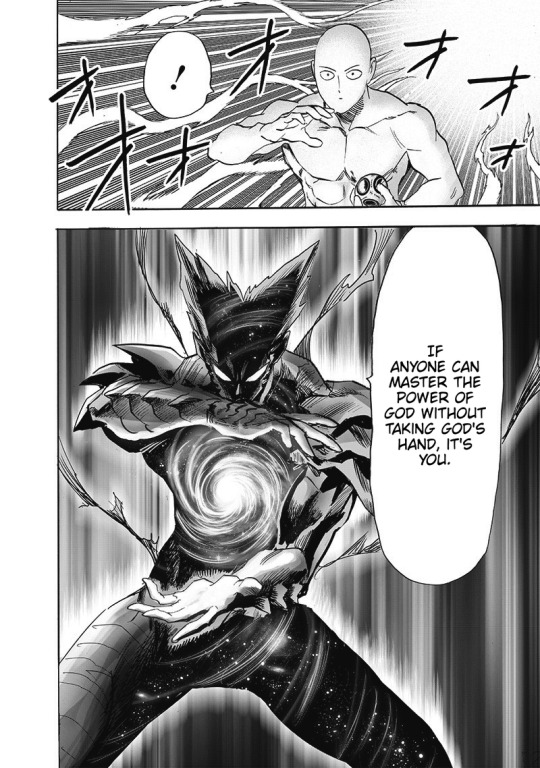

So naturally, the God above is not pleased about this progression. About any of it. Saitama wasn't supposed to kill Orochi (I think) and he was supposed to kill Garou, to erode his humanity, his trust in it and what is good and evil and human and monstrous. As it is trying to brainwash Saitama into doing his bidding.
(I like that eye of sauron reference haha)
God's evil eye may also be a reference to Kade, finnish folklore witch who harmed others with their jealousy.
Kade is a witch in Finnish folklore who has magical powers and is believed to be able to harm others with her jealousy.
Often the kade would look with an evil eye, so being the object of the kade's gaze was the most dangerous thing to do.
So how does any of this pertain the OVA 1 special episode anyways?
We look into the mythology of the self in finnish mythos.
The self has apparently been, according to the ancient Finnish concept, a part of the human soul, a spirit being, a soul being, belonging to the soul and separate from the other parts. The pronoun Itse has become the modern Finnish pronoun itse. Only a few signs of the concept of the self as a spirit being have survived in the Eastern Finnish language area, but in some distant languages the equivalent of the word 'self' means exclusively the part of the soul. In Mordvian, for example, issi is a soul being, of which humans had several. The self could in some way correspond to Nature, which was most often perceived as a guardian outside the soul, but which nevertheless gave its name to a fundamental feature of the human soul, nature.
The Self is like a shadow or shadow soul of the soul, separate from the self but parallel to it, as it were a reflection of it. The Self may even be a parallel double of the human body. The Self can precede man in his figure. The human figure of the Self walking in front of the human figure can cause Etiäinen.
The self may have been lost, making the human being selfless. A selfless person is seriously ill, pale, depressed or unhappy. For example, the self may have been taken away by the devil from the person who broke his oath. The deceased may have taken the self to the underworld (deceased's grave) even before the person died. Alcoholism can also take the self. In terms of how the self can be lost, it would seem that the self would mean something like self-esteem, self-image or conscience, which can be taken or corrupted by, for example, guilt, self-loathing or deep depression.
Before or at death, the self has gone its own way, and may, for example, have shown itself to distant living relatives. The person himself has also eventually become a dead person. On the other hand, ghosts, such as the egret, (myling) may be the person who has remained in the human world. One suggested origin for the name ihtiriekko is a dialect form of the word itseriekko.
In essence, the implication is that Saitama has lost part of his self, his spirit, which are his soul images. It has been taken from him by something and that's why he's ailed by his waning humanity and emotions. So he is not physically dead but essentially spiritless and has the eyes of a dead fish. Most likely because he too, just like Garou, dared to fall in love at some point of his soul's existence and the loss of such contributes to his dull existence.
That's why he feels like he's not part of the reality any longer or part of the society that he talks about with King.


Helene Schjerfbeck painted a great depiction of the spirit leaving the body and growing world weary and older. I have personally thought in the past if Saitama feels time different due to his powers and why he thinks people like Genos are "so young", despite his mental age not being that much older at 25 years old.
She painted many paintings throughout his life, depicting ageing and the gradual separation of the spirit from the body. In her self-portrait from 1945, little remains of her externally due to her ageing.
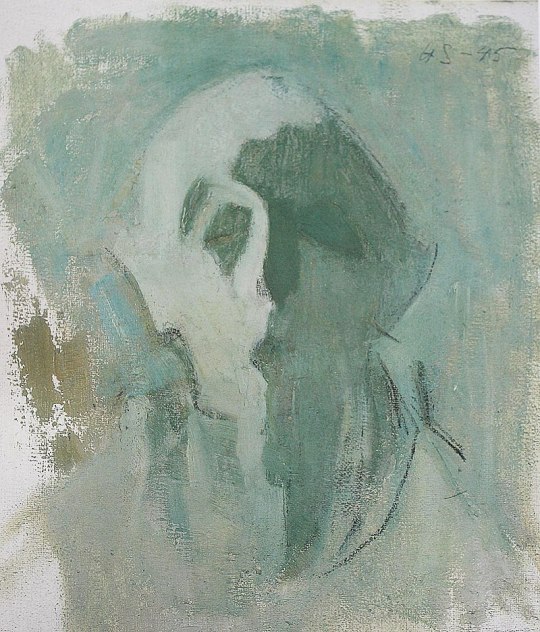
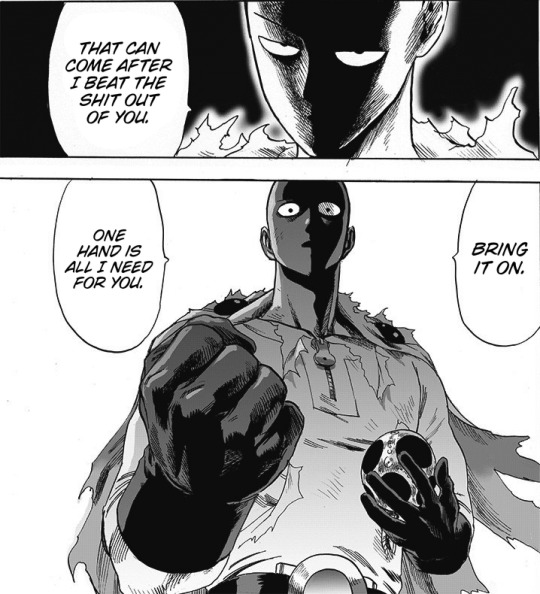
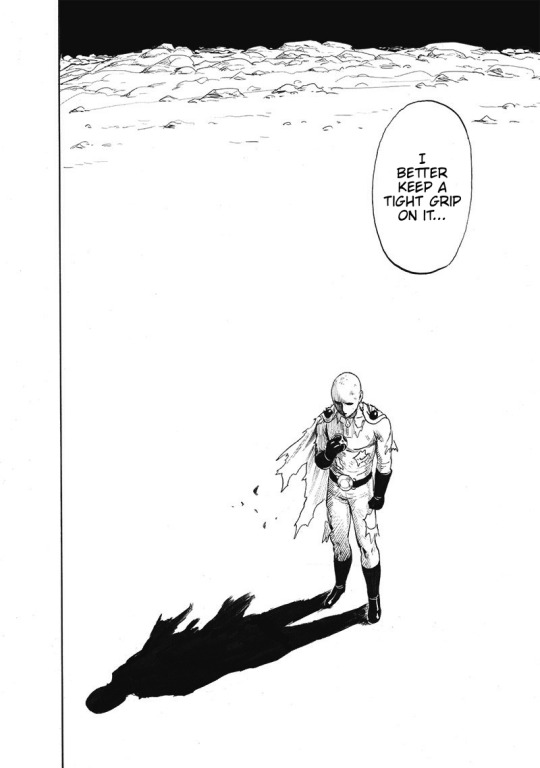
You make me resist God, you make me resist the world
You've fallen in love
I don't know if it's evening or morning
I have lived with the living
now I die away with the dead
fallen in love
I am and I walk pale as a ghost
Genos saved his spirit and so, Saitama has fallen into the notch just like Garou. Caring about someone, loveen langennut, falling in love, made him almost destroy the entire world.

It is very symbolic how the heavens and earth is parted between them when they met. There is a notch, a line between them and the other side is bloody. But also full of life.
A human leprechaun (guardian) can go away from a person for a long time. In this case, the person is elfless, i.e. unhappy, sick or depressed. The elf is often pale or bloodless, having lost his blood. The bearer may also be left behind if the person moves quickly and over long distances. The condition is also known as loneliness (without self). This refers to the self as a special being. However, the equivalence of the self with nature is uncertain, though not impossible.
More wordplays because haltijoitunut, like having an elf, is a wordplay about being passionate. Such as when Saitama is passionate and protects other people, he rediscovers his inner self, his spirit. When he protected a little kid from monster, notably.
Pale and bloodless is reference to Zombieman looking pale because he's a depiction of undead.
Saitama himself stated to king how he feels hollow and how he feels lonely, without self. He's not living properly. He has lost his lifeblood and that's why he attempts to hurt himself so much, to keep the lifeblood flowing and desperate attempt to feel life drum inside his veins, why he seeks out opponents to fight and for a tough fight. He had lost his life and will to live.
The bearer having been left behind if the person moves too quickly and over long distances, may be a reference to God's mural.

The God being below inside Earth, may be a reference to what is known as Myling in scandinavian folklore. It is also a depiction of a human cardiovascular system, the lifeblood that one is supposed to have coursing through their veins in order to life. The shadow of the soul. In finnish mythos, the shadow of the soul is let loose once a person sleeps and in death permanently.
Saitama's dream scenario against the subterraneans basically.
Shadow of the self is also a concept in Jungian psychology.

According to Finnish beliefs, the Ihtiriekko (also bastard, flame, foetus) is the ghost of a child or foetus buried without blessing, baptism or in the wrong place. It was often said that an ihtirieko was buried under the house of its mother and cried in a gruesome way. Nowadays, the egret can be called a young, noisy troublemaker
Finnish ancient religions -book source more details? it is said of the sword of yew as follows; "The sword of yew is the body of a child born in secret, killed in secret and buried in secret, which will not rest in peace unless someone reveals the child's mother or receives a blessing."
It was often said that the widow's mite was a bastard child killed by the mother to keep an illicit relationship secret. Even the child's body had to be disposed of in secret, it could not be taken to church and could not be blessed by the priest. So the child was buried under the house, in the woods or in the garden. The child's soul was put in a state of suspended animation, it could not enter the afterlife because it was not blessed. The one buried in the yard would cry and disturb the people in the house, or if the body was in the woods, the ghost would frighten passers-by with his cries. The ghost would only stop haunting if someone found the body and gave it a proper burial.
One possible explanation for the name is the dialect form of the word itse-riekko. This would mean the shadow soul or soul bird of a slain child among the bird's characters. Itse is a human shadow soul found in Finnish mythology, which was believed to remain on earth to haunt after death.
Another meaning of the ambiguous flame is the restless soul of a wrongly buried child.
The implications can get pretty dark.
Whether this is a parallel universe or not is unclear, but monsters started appearing when Saitama was only 2 years old and when he first got his infantile sense of omnipotence. The ability to manipulate causality, space and time, his inner child.
So take that as you will. There may also be soul reincarnation at play. Or parallel universes. Or doppelgängers or twins or time travel shenanigans.
The belief that mylings are enraged and seeking revenge is what gave them the reputation as one of the most menacing types of ghosts in Scandinavian folklore.
Enraged, wrathful god Asura who wants to kill humanity is depicted in Saitama's dream scenario as well and as a hidden easter egg, you can see the words "ashura" written on the hand. According to Phoenixman and Vaccineman, humanity is a disease that needs to be wiped out.
Anyways, that's a lot of probably unnecessary amount of prefacing because I found the mythos connections quite interesting.
We know God can manipulate time. Saitama can now travel in time. Genos has the memory of how to time travel. Parallel worlds are apparently a thing. The godly being below may be related to Saitama's soul/spirit. We have a lot of ways to explain the following phenomena that happens in the OVA1.
When Saitama notices a mysterious shadow inside his room. And interesting stuff happens.
I am putting my money on doppelganger.
A doppelgänger refers to a person who bears a striking resemblance to someone else, another person who looks the same. It can also refer to an imaginary ghostly counterpart of a person, a second self, a full face or a copy of a person.
In fiction, the motif of the double is usually based on the physical resemblance of two people, with unexpected consequences for the person and his or her environment. In folklore, the real doppelganger is often accompanied by invisible doppelgangers, which refer to another self or soul of the person. They usually describe a person's spiritual upheaval
A belief doppelganger is a being that appears in the form of a person without being the person. The double may be part of the person's own spiritual being, or it may be a separate spirit being or an elf, for example, the person's guardian. Of the guardian beings, at least the demon of the Greek tradition and nature of the Finnish tradition sometimes appeared as a double. The doppelganger could also be a shadow soul.
In many cultures it has been believed that every human being has some kind of double or shadow person. This doppelganger may live underground in another reality very much like our own, perhaps even upside down, or it may live in a spirit reality. The doppelganger may also be in a different time from the actual person, ahead or behind them. This kind of explanation has sometimes been used to try to explain etherealism, divination or haunting. Premonitions would be due to the arrival of the doppelganger somewhere before the actual person, while haunting would be due to the doppelganger's wandering along the path of life after the actual person has already died. Divination has been explained in terms of the doppelganger having already experienced something that is yet to happen to the person, and being able to tell about it. Meeting your own double is sometimes thought to be an impossibility. Sometimes seeing a doppelganger is thought to foretell disaster.
About this phenomena called Etiäinen.
According to folklore, an animal is an image, double or sensory impression of a person, who goes before him and does or is about to do the same things that the person later does. The experience of encountering such a 'being' can also be called 'ethereal'. The entity can be heard, sometimes even seen.
For example, people may hear a family member walk into the yard, open the door, even see this figure or shadow, until they realise that he or she has not actually come yet. Soon, however, the family member comes and repeats the same thing as the person who came before them.
The etiäinen is three days old and follows the characteristics of its human counterpart. Especially energetic elves have the ability to act as messengers outside their host. The word can also mean foreboding
In Finnish folklore, all places and things, and also human beings, have a haltija (a genius, guardian spirit) of their own. One such haltija is called etiäinen—an image, doppelgänger, or just an impression that goes ahead of a person, doing things the person in question later does. For example, people waiting at home might hear the door close or even see a shadow or a silhouette, only to realize that no one has yet arrived. Etiäinen can also refer to some kind of a feeling that something is going to happen. Sometimes it could, for example, warn of a bad year coming.
In modern Finnish, the term has detached from its shamanistic origins and refers to premonition. Unlike clairvoyance, divination, and similar practices, etiäiset (plural) are spontaneous and can't be induced. Quite the opposite, they may be unwanted and cause anxiety, like ghosts. Etiäiset need not be too dramatic and may concern everyday events, although ones related to e.g. deaths are common. As these phenomena are still reported today, they can be considered a living tradition, as a way to explain the psychological experience of premonition.
One explanation given for the detail of the apparition is that when a person is waiting for someone, their anticipation can augment everyday sounds, for example of a cat or the wind, and bring to consciousness a vivid recollection of the person. This recollection will tend to produce the feeling that the remembered person is "coming". If no one comes, the "possible etiäinen" is forgotten. The failure of this explanation is that etiäinen is not necessary when you expect someone to come. It more often indicates an unexpected visitor who would otherwise come as a surprise without phone calls or any kind of announcement beforehand.
It is also a type of Haltija.
A haltija (haltia) is a spirit, gnome, or elf-like creature in Finnish mythology that guards, helps, or protects something or somebody. The word is possibly derived from the Gothic haltijar, which referred to the original settler of a homestead—although this is not the only possible etymology. It can also be derived from the Finnish verb hallita, which means 'to rule', 'to command', 'to master'.
The word is also used in modern Finnish to mean, depending on the context, holder, occupant, lord, master, owner-occupier, occupier, possessor, bearer, or owner.
There are many different kinds of haltijas. There are, for example water haltijas and forest haltijas. Even graveyards have their own haltijas (kalman väki, "death folk").

(The joke goes that Genos is the housewife. The joke reference may be a bit more serious and accurate than that. If it quacks like a duck and acts like a duck, it's probably a duck)
(In one OVA, Saitama gives the keys to his house to Genos, who then protects it. Albeit it does get burned. Genos is just kind of dangerous like that, it's in his very nature. He burns like the firey soul that he is)
Väki (folk) of fire: (tulen väki) means spirits of fire, but also the destructive forces of fire and healing power of warm air, for example in a sauna.
Person 1: There it is, standing in front of the spacecraft!
This is trouble, your mom got a call from someone, saying she was your fiancee!
Person 2: No, it can't be! And the alien's been taken out.
Person 1: She contacted me too.
"Everyone in my way has been eliminated. I can't wait for our date tomorrow."
Person 2: I never agreed to any dates! The woman's more dangerous than the aliens!
Saitama: Man...stalkers are really scary.

Saitama wonders how he would handle it if that anger or grudge from being defeated by him turned into some kind of warped love.
And then suddenly, a shadow appears in his room and he instinctually senses it and turns around, only to see nothing.
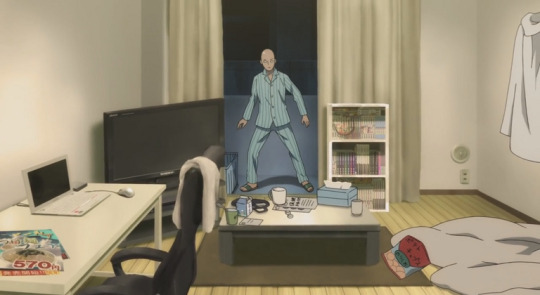
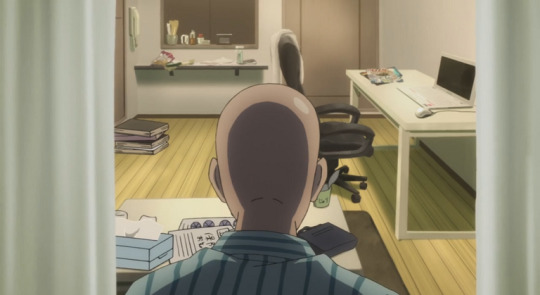
"This place is getting pretty messy."
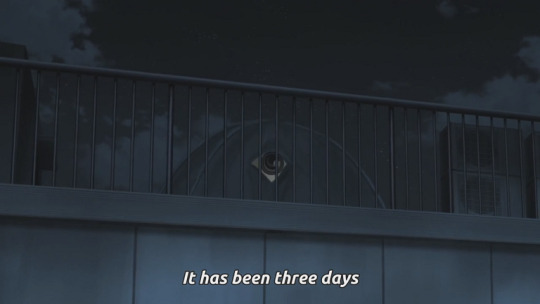
Something happened when Genos started stalking Saitama.
Saitama experienced a premonition. An Etiäinen had appeared. Or multiple ones. Etiäinen takes 3 days to appear according to folklore, exactly how long Genos had been stalking Saitama. 72 hours and 26 minutes to be precise and after Saitama went to bed.
Quite possibly he experienced an Etiäinen of Genos. An ethereal image of a family member apparition, a shadow, then the family member comes and repeats what was done later. And what does Genos naturally do first? Clean. And feed Saitama good food. In this case specifically, get some udon. Which they go get later.
Saitama actually got haunted for real too.
If you look closely...
Saitama's computer desk is suddenly far more clean and the items are now placed on top of the window balcony and the window leading to the kitchen. What appears to be possibly a sports bottle and bag of chips. The trashbag is also suspiciously absent.
Only a leaflet of Udon place remains, advertising it for 570yen. That wasn't there before. Where did it come from?
(Subtle, real subtle. I love how anime has small details like this)
You could say that maybe Saitama just cleaned in between, but then he would've had to change his clothes to go outside and take out the trash. And nobody takes out the trash during the nighttime. He watched a movie and went straight to laundering his clothes.
So why is this leaflet of Udon place important? That suddenly appeared on his desktop?

"if I continue being a hero, this won't be the last time someone's out for revenge against me. That is my fate. It can't be helped."
After Genos stole his fry, Saitama was left annoyed and he was having a bad day and he was in a bad mood, so he wanted some comfort food as replacement for the poor meal he had previously. So he went to check out this Udon place where he had a leaflet for. His favourite foods usually tend to lift his spirits, figuratively and metaphorically.
"I just need to change how I think. Right, I need to think positively! I just have to believe there will be people in this world who appreciate all the things that I do. I became a hero three years ago. I'm not saying I need fans, but it would be nice if someone noticed what I've been doing…"
Then Saitama has a sudden recollection about the person who wanted to become his disciple.
"Oh yea there was that guy who wanted to become my disciple."
One explanation given for the detail of the apparition is that when a person is waiting for someone, their anticipation can augment everyday sounds, for example of a cat or the wind, and bring to consciousness a vivid recollection of the person. This recollection will tend to produce the feeling that the remembered person is "coming". If no one comes, the "possible etiäinen" is forgotten
This new Udon place becomes more important later too. It is the very same Udon place he takes Genos into later after they spar, but now he ran low on funds because he had visited this Udon place to eat food previously. So he initiated an Udon eating contest.
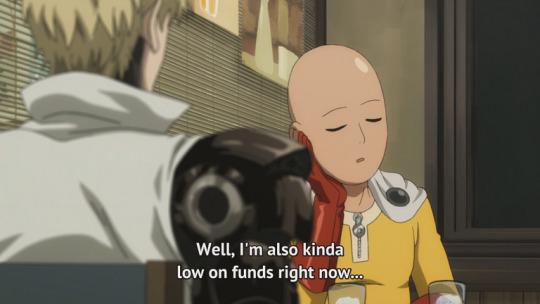
What the Udon eating contest does is endear Genos to Saitama, but afterwards it was also when he and Genos officially became professional heroes.
(Theme of jealosy, the hidden monster and Saitama beating it also present)
Without Genos, Saitama would have never become a professional hero. And without Genos, Saitama wouldn't have been saved from his loneliness. From his spiritual demise. Chances are, he would have remained in a bad mood if there just hadn't happened to be a convenient Udon place nearby that he just happened to have a leaflet for. Or turned to the more convenient and cheaper alchohol. To forget and dull the memories.
Once in Tuonela, the living were not allowed to leave. They would be welcomed by Tuonetar, who would offer them a memory-erasing beer to erase their former lives.
Here's where the Montsuki haori reference in Road to Hero Ova, that being a metaphor for his hero suit which he won't wear yet because he can't let go of his memories, a stain on his clothes which is a black mark on his heroism, comes into play. Genos is the one who wants to give him a new hero suit. It is used as an exchange of bethrothal gifts and fiancee is mentioned in the OVA on the movie, after which Saitama experiences a premonition, an ethereal apparition about a possible family member.
(Am I implying soulmate Saigenos? Yea :D)
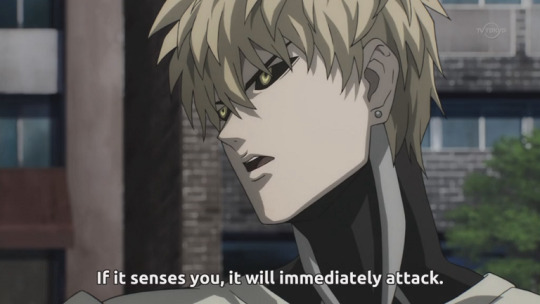

Saitama was already so spiritually dead, so even Genos sensors got fooled, so he just blasted away without questioning much and only later realised that he essentially just blasted away a potential civie with full power. The same sensors which can track Saitama even when he's fighting inside nuclear clouds.
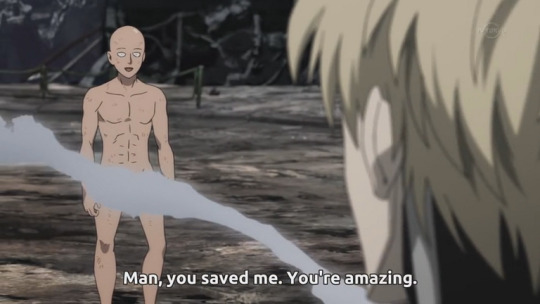

Genos in every sense of the word, became a guardian spirit for Saitama's spiritual well being. Against the stalker that wants revenge. The french fry thief, who stole part of Saitama's food, his happiness, comfort and heart. Coincidentally in a family restaurant too.
Because Saitama doesn't take kindly to those who steal his happiness, his heart.
"I don't care how many times you come back to challenge me. But let me just say this...Don't you ever go around stealing people's French fries again. If you're gonna come at me, come at me straight."
(That includes you too, Genos, you fry thief. In good or bad way, you stole his heart too)
The original meaning of the word 'nature' (luonto) is the protector of man. The word nature has the same meaning. According to Finnish mythology, human nature is a spirit being that follows man and influences his happiness, character and success. Only later has the word nature acquired its present meaning.
There is a spell to invoke the spirits of the nature.
If you have a weak nature, you can use spells to call upon nature or to strengthen your nature. Nature was also invoked against evil, enemies and diseases, and to give more physical, mental or supernatural abilities. In the spells, nature is called upon to rise from a notch and a deep place, apparently vainajala (underworld).
»Nouse luontoni lovesta,
Syntyni syvästä maasta,
Ha'on alta haltijani
Vastuksia voittamah,
Katehia kaatamah,
Sotisia sortamahan...»
»Noin luonto lovesta nouskoon,
Haon alta haltiani,
Kuin nousee Jumalan ilma!»
»Nouse luontoni lovesta,
kiven alta kiilusilmä,
paaden alta paikka poski,
hongan alta haltijani,
pue päälle palava paita...»
Rough translation goes as follows:
"Rise from the notch of my nature,
From the deep earth of my birth,
From beneath my Ha'on, my fairy (haltija, gnome, the guardian spirit)
To overcome the odds, To overthrow Kateh, (kade, jealousy, the finnish folklore witch)
To oppress the wicked..."
"Thus shall nature rise from the notch,
From under Ha'on, my fairy, (haon, tree branch on the ground)
As the air of God rises!" (thunder)
"Rise out of my nature's notch,
From beneath the stone, the eye of the gleam,
From under the rope a place of cheek,
From under my honga, my fairy,
put on a burning shirt..."
Kiilusilmä
eyeshine (visual effect caused by tapetum lucidum)
For example, Cat's eye

"Nouse Luontoni lovesta" is a wordplay again, about the nature of self rising from the love for it and from the notch. Justice enforcement. Genos eyes gleam like cat's eyes whenever he goes into battle mode, to enforce it.
"That is my fate. It can't be helped."
With little help from a friendly mosquito, the divine intervention...
Then, she entreats a bee to ascend to the halls of the over-god Ukko and fetch from there a drop of honey as ointment that would bring Lemminkäinen back to life. Only with such a potent remedy is the hero finally restored.
Yes it can be Saitama. Yes it can. It is already being changed.
Loveen langennut, you falling in love and caring about someone has already changed your fate, giving you life.
Instead of meeting with a terrible fate, you got a fateful encounter instead.
The metaphor of your own humanity, the mosquito you could not manage to squish, leading you to your own guardian spirit.
(heck yeah Majora's mask Happy mask salesman reference, in one way Orochi reminds me of skull kid masked and unmasked)
(witches of lapland, the shamans, lose their teeth when they grow older and lose their powers)
(Saitama's belt may be a depiction of Voimavyö, a metal power belt, that is believed to give the wearer more spiritual powers)
#opm#one punch man#saitama#genos#saigenos#genosai#opm meta#finnish folklore#kotiteollisuus#shamanism#spiritualism#animism#paganism#loveen langennut#long#opm manga panels#opm anime screencaps#kalevala#tuonela#lemminkäinen
17 notes
·
View notes
Text
Me and my classmate agreed that Lemminkäinen is an aromantic homophobic bisexual and Aino is sapphic
If asked, I may elaborate
3 notes
·
View notes
Note
This is more for mun, than for Finland in rp. and this isn't a question. My sister and I had discussed the human names in Hetalia and that Himaruya isn't the greatest at them. We got to Finland, and talked about his last name. We learned that he's a mythological figure. ok cool. the more we talked, the more we made some headcanons. Finland is canonically... bad at naming things. His name choices for the dog, before settling on Hanatamago were strange. (1/?)
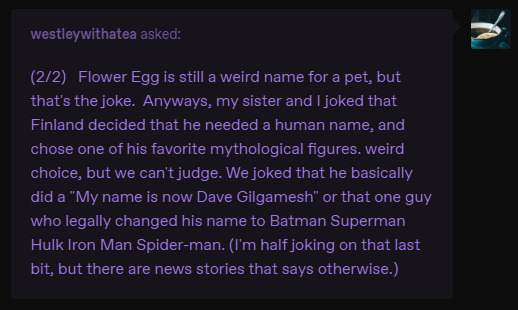
((That is a fun hc! I will say though, Väinämöinen actually doesn't sound unrealistic as a Finnish last name. :D
Names of figures from Kalevala are more often used as first names (such as my two cats Kyllikki and Kullervo :3), but Ilmarinen and Tapio are good examples of last names taken from the mythology!
I haven't encountered Väinämöinen as a last name in the wild so to speak, but a shortened Väinämö does indeed exist both as a given name and family name. (It actually happens to be our current president's middle name!) So a whole Väinämöinen as a last name would probably be rare but not raise eyebrows here!
(EDIT: according to a quick search on the civil registry there have been exactly 7 people with the last name Väinämöinen, though none currently living. (unless...?) I also looked up my last name and it's only ever been owned by 83 people, living or dead, so hey a pretty special boy over here >:3)
tldr; dave gilgamesh? in finland? more likely than you think))
#((from reading the post linked in replies i actually realized i haven't really considered Fin's middle name!))#((maybe Kalevi? just off the top of my head?))#((edit i tried out some more -nen ending kalevala names on the registry out of curiosity-#-and apparently there are also a handful of people with the last names Joukahainen and Lemminkäinen! the more you know))
34 notes
·
View notes
Text
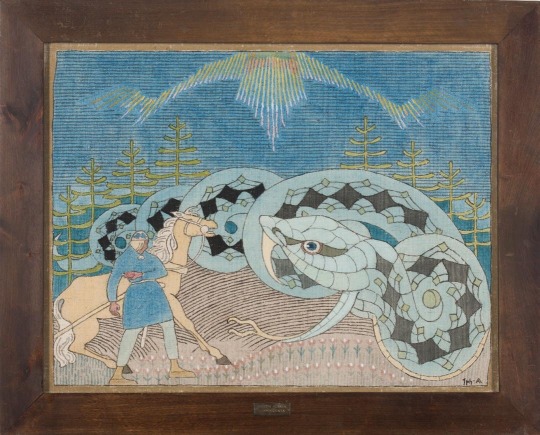
Lemminkäinen and the Great Serpent
Illustration by Joseph Alanen
tempera on canvas, 1919-1920
22 notes
·
View notes
Text


same vibes
previously in the series: click here
#blind channel#joel hokka#lemminkäisen äiti / lemminkäinen's mother (akseli gallen-kallela 1897)#this is bad and i apologize#particularly to all the finnish peeps out there lol#joel-lemminkäinen saw the swan of tuonela (the afterworld) and passed away#it's okay he's in a better place now 🙏#bc+art
29 notes
·
View notes
Text
its national kalevala day. here’s my kalevala post:
ilmarinen is babygirl.
#väinämöinen mansplains manipulates and manwhores#lemminkäinen has huge glutes i know this cause väinämöinen appeared to me in a dream and told me#kalevala#blorbos from my karelian folklore
3 notes
·
View notes
Text
.
saw my mother for the first time in three years like ten days ago and she still knows nothing about me because she doesn't ask and she's messaged me like twice after so i guess i was right and i really do not have parents, and i'm going through the worst flare up of my chronic illness in like three years and i burnt the roof of my mouth and then had a teeth check up the morning after and then i went home just to go back to the same building a couple hours later to talk to a strange new doctor about my mental health problems and i was not really prepared for how intense the questioning was and now they're considering ect and i'm exhausted and i still don't have an answer on what my financial situation is going to be and that's been going on for 3 and a half months already and my internet keeps going out when i'm trying to publish a fic or read the before classes start! readings and my first class is starting tomorrow and i'm on my period and i'm going to snap
also i'm just so tired of being asked if i have people to turn to if everything goes bad bc it's like hmm i know this is standard questioning but do i really have to keep saying i have no support system out loud? like no i don't have anyone <3 i know i can call the emergency number but i'm hoping this time they won't hang up on me or kick me out of the er which have both happened before when i was suicidal <3
destroyed mentally by having to say things out loud i guess instead of pretending like it isn't happening and disassociating for weeks on end
AND no one told me that if i DO get a therapist it's supposed to be one or two times a week???? i have NO money??? i was trying to figure out how to come up with an extra 40 euros a month 160 is unthinkable???
also my mother was very clear that i cannot go home even if it's staying with a friend and just coming to get my things when my f*ther is out. so idk how long it will be until he's dead and i had so many notebooks and pictures from when i was a child along with all my books and such. i didn't bring a lot when i moved across the ocean.
not even sure how psychotherapy is supposed to help the crushing weight of never having been loved enough in my life with many attempts at getting to know people ending with 'oh you're too hard to love' on top of whatever did or didn't happen in my childhood. which i'm not even making up. multiple people have said that to my face. and i'm cold and distant and i don't let anyone close <3
people like 'you're so kind but so cold' okay i contain multitudes???
#little rant bc too much is going on#deleteing later#txt#my mother treats me like don't ask questions you don't want the answer to#abuse mention#medical#i'm not even hanging on by a thread#i'm on the bottom of the canyon staring up at the snapped rope#my icon has been Lemminkäinen's Mother bc the expression is how i feel
4 notes
·
View notes
Text
Järvi/Gabetta: Saint-Saëns/Sibelius - Tonhalle Zürich 15.03.2024
Järvi/Gabetta: Saint-Saëns/Sibelius - Tonhalle Zürich 15.03.2024 #tonhalleLATE #tonhallezürich #tonhalleorchesterzürich #paavojärvi #solgabetta #jeansibelius #camillesaintsaëns #stimming #electro #konzert #review #zürich
Ein sehr cooles Event und gleichzeitig ein kluger Marketing-Schachzug – die Tonhalle LATE. Mittlerweile ein Klassiker, findet diese Veranstaltung zwei mal pro Saison statt, ist immer ausverkauft, also rappelvoll und mit überwiegend jungem Partyvolk in Feierlaune. Das Motto: Classic meets Electronic. Nach einem klassischen Konzert mit Werken aus dem Programm der vorangegangenen Konzerte begegnen…
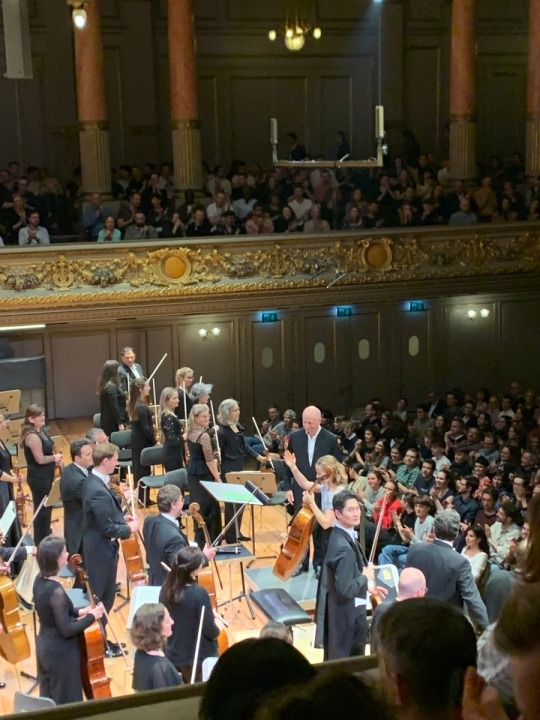
View On WordPress
#Camille Saint-Saëns#Cellokonzert Nr. 1 a-moll#Concert#Jean Sibelius#Kollektiv Packungsbeilage#Konzert#Kritik#Ksenia Ignatenko#Lemminkäinen und die Mädchen auf Saari#Lemminkäinen zieht heimwärts#Lemminkäinen-Legenden#Lemminkäinen-Suite op. 22#Paavo Järvi#Rezension#Sol Gabetta#Stimming#styro2000#Tonhalle Orchester#Tonhalle Zürich
0 notes
Text
Lemminkäinen: Guys, I didn’t memorize my lines!
Väinämöinen: Just use your lack of common sense! Everyone knows the characters in plays are dumb!
*During the play*
Ilmarinen: Hey! You finally made it! Did you get the donuts?
Lemminkäinen: W-what’re donuts?
#queue#mythology#finnish mythology#incorrect quotes#source: perchance generator#kalevala#vainamoinen#väinämöinen#lemminkainen#lemminkäinen#ilmarinen
8 notes
·
View notes